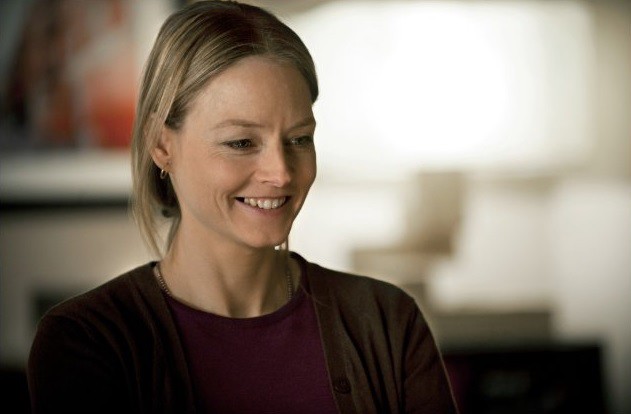Two-time Academy Award winner Jodie Foster has received a star on the Hollywood Walk of Fame. “I grew up blocks from Hollywood Boulevard and would cross it every single day of my life,” said Foster. “And you do that thing where you’re like, ‘Will I ever be on the Walk of Fame someday?’”
Foster had in fact been offered the honor earlier, but chose to wait. “I made this conscious decision that I didn’t want to have a star on Hollywood Boulevard unless it was in a conjunction with a movie I was directing,” she explained. That’s why she “waited all these years” — so the timing would coincide with “Money Monster,” the fourth film she’s helmed. The drama stars George Clooney as a financial adviser and Julia Roberts as his producer. Roberts is tasked with defusing an on-air crisis situation when a disgruntled viewer takes Clooney hostage. The film opens in theaters May 13 after premiering at Cannes.
Foster, one of the most visible female directors, spoke with Julie Taymor at the Tribeca Film Festival where she addressed the “women director issue.” Both of them said they would rather not talk about it anymore. She said that it is a complicated issue and that she wished the dialogue was more complex. She also said that she didn’t think there was a plot against women, but that “it’s neglect really, including from women who have risen to the top and who have not brought women along.”
“The Silence of the Lambs” actress, who booked her first acting gig at the age of three, recently discussed her illustrious, decades-long career with the Directors Guild of America. Here are some of the most interesting tidbits from the comprehensive interview, which can be found in full on the DGA’s official site.
When she knew she wanted to direct: “I was six or seven and doing a television show called ‘The Courtship of Eddie’s Father.’ I came to work one day and [series star] Bill Bixby was directing. I don’t know why it didn’t compute, but I just didn’t know that actors were allowed to direct. My mind was completely blown. I thought, ‘That’s what I want to do someday.’ … There really weren’t any women directors. But I didn’t think becoming a director was possible anyway. My mom told me that you had to be a writer to be a director. Obviously, I’d act as long as I could because that’s what I’d always done. But everyone kept telling me that my acting career would be over by the time I was 18. So I thought I’d become a writer so I could go on and direct.”
The first thing she directed: “I was about 13 and doing “Freaky Friday,” and the BBC did a documentary on me. They said, ‘Since you say you want to direct, we’re going to give you a crew and you can direct a short.’ So I wrote this little thing. I don’t think there was any sound, no dialogue. Just different hands — then it ends up with an old person and a baby. It was called ‘The Hands of Time,’ and they played it during the documentary. It wasn’t that clever. [Laughs.] But it was really well shot. I had a great crew.”
What kind of leader she is: “I think I’m really honest. I’m a good communicator. I respect the actor’s boundaries. By boundaries, I mean I don’t try to get inside their experience and be like, ‘Let’s cry together,’ or ‘Let me tell you about when I was three.’ I stay outside their process and try to help them the way an editor would.”
Her thoughts on diversity behind the camera: “It’s an interesting time for me, [having learned] to be a director from all these guys, who are really father figures in some ways. I really was a prodigal daughter and it’s hard for me sometimes — I never want to come out and condemn the movie business, because it’s been so supportive of me…I made movies in the old days where there were no women. I remember being surrounded by a bunch of guys in a small town like Kanab, Utah, or wherever, and the culture was different. There were lots of guys running around and looking at the girls in town. It was crass. It didn’t feel like real life. I think those men were in pain a little bit. They left their kids and wives at home to be away at boys’ camp. When women started coming into the picture, when a set became more diverse, it felt like it got healthier. People didn’t feel so lonely, desperate, so cut off.”






